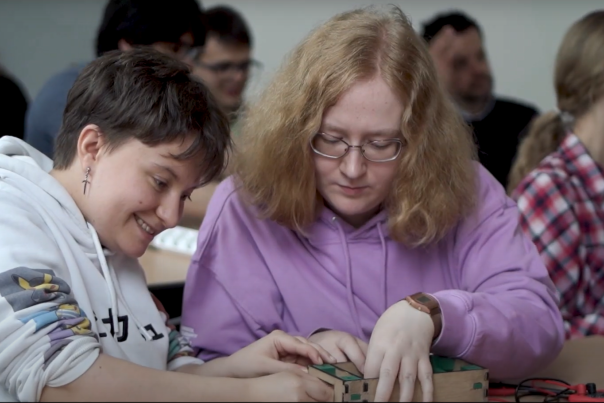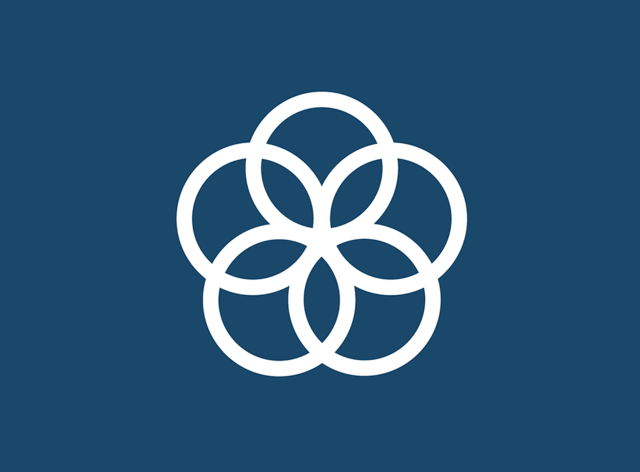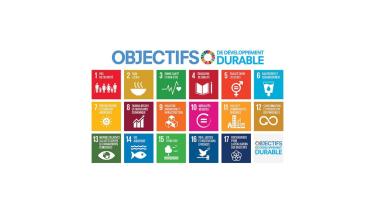On this page, you will find a report on all the actions and activities initiated at the University of Namur in connection with United Nations Sustainable Development Goal #17: "Partnerships for achieving the Goals".
Social impact and actions
Institutional initiatives
Green deal - Sustainable food
UNamur is committed to the 6 principles of the Green Deal :
- Local and seasonal produce,
- Environmentally and animal-friendly products
- Fair trade products
- Healthy, balanced and tasty meals
- Reducing food waste and waste
- Social inclusion
L'Arsenal - University Restaurant
Students benefit from a special rate for the hot dish of the day (€4) served at the Arsenal university restaurant.
La Solidarithèque
La Solidarithèque is a solidarity grocery store whose aim is to support higher education students facing financial difficulties. It is created and managed by the social services of UNamur, HEAJ and HEPN in partnership with the Association pour la Solidarité Étudiante en Belgique (ASEB).
The CoKot
This project kot (KàP) supported by UNamur offers solidarity meals for students. More info on the Facebook page...
Cap sur les KàPs series in the newsroom: The CoKot
Annual flea market at the old orchard of the Haugimont estate
Each year, UNamur proposes an event at the old orchard of the Haugimont estate. Numerous activities are offered throughout the day: marauding with free marauding bags, explanations on the management of the organic orchard, children's activities, information stands, guided and commented walks...
Les Ruches du Carmel
Four beehives have been installed with the dual intention of contributing to local biodiversity and offering a new educational tool for university students.
UNamur institutional services and activities
The International Relations Department: projects, partnerships and networks
Philippines studies project
The University of Namur has been chosen by the Philippine government, along with seven other universities worldwide, to promote the various facets of Philippine studies in Belgium and Europe. This program highlights the collaborations that researchers at the University of Namur have developed with several Philippine universities and researchers. It also contributes to the promotion of Philippine studies at an international level. It includes several themes and activities that will run until June 2023, and is also an opportunity to explore new avenues of collaboration at the academic, cultural and political levels. Learn more.
Academic Cooperation
The Academic Cooperation between Rwanda and Belgium celebrates this year 20 years of collaboration and mutual commitment between the universities of the Wallonia-Brussels Federation and the University of Rwanda. With the support of the Académie de recherche et d'enseignement supérieur (ARES) and in partnership with the Belgian Development Cooperation, the architects of this cooperation have patiently and tenaciously forged strong links.
Partnerships
The University of Namur has established institutional or faculty agreements with foreign partners. It is also a member of several international associations. More info here.
The networks
- Agence Universitaire de la Francophonie (AUF)
- European University Association (EUA)
- Federation of European Catholic Universities(FUCE)
- International Federation of Catholic Universities (FIUC)
- International Association of Jesuit Business Schools (IAJBS)
- UNESCO (Palestinian European American Cooperation in Education)
- OECD Programme on Institutional Management in Higher Education (IMHE)
Le Service Vie de la Communauté Universitaire (Vécu)
Le Vécu's mission is to inform and welcome students, with the aim of helping them integrate and flourish during their stay at the university. In the current context, enabling students and staff alike to get involved in civic action and solidarity is one of UNamur's priorities. Learn more.
Heart of the Forest - UbiCast project
For the past two years, UbiCast, supplier of the in-auditorium recording solution deployed at UNamur, has replaced its end-of-year "goodies" with participation in reforestation projects. This year, UNamur is sponsoring 22 trees located on a project plot in Bolivia.
L'Assemblée Générale des Étudiants (AGE)
UNamur collaborates with the AGE to pursue certain policies for sustainable development. For example, the generalization of reusable cups at campus events or biodiversity and conviviality at Bon Pasteur. Learn more about AGE.
Le Forum Universitaire de Coopération Internationale et de Développement (FUCID)
FUCID is a development education NGO active on the Namur campus, offering conferences, awareness-raising trips e.a., with the aim of bringing about sustainable, individual and collective changes in behavior and values at the social, economic and environmental levels, and also developing citizenship and solidarity attitudes. Find out more.
Journée des Etudiants en Transition
Students were invited to immerse themselves in an exciting day dedicated to the ecological and social transition of youth.

Team mentorship - The career of future PhD holders
Specifically dedicated to future PhD holders, Team Mentorship is an inter-university program that aims to support junior researchers (First Stage Researcher (R1)) from all fields of scientific research in the development and refinement of their professional project, whether in the university (academic) scientific environment or outside it, in the private, public and associative sectors. Find out more.
In the Wallonia-Brussels Federation (FWB)
UNamur, like the 5 other FWB universities, is present on various ARES commissions:
- CAR | Commission d'aide à la réussite
- CCD | Commission de la Coopération au Développement
- CDD | Commission développement durable
- CESI | Commission de l'Enseignement Supérieur Inclusif
- COFOC | Commission de la Formation Continue et de l'Apprentissage tout au long de la vie
- COM | Commission de la mobilité des étudiants et du personnel
- COVEDAS | La Commission Vie Etudiante, Démocratisation et Affaires Sociales
- CRI | Commission Relations Internationales
UNamur, like the other 5 FWB universities, is present on various "Gender" committees and networks:
- Gender contact persons
- Comité Femmes et Sciences
- CoGES | Commission Genre en Enseignement Supérieur de l'ARES
- GAS | Groupe Genre, Activité, Santé
- Réseau Sophia | Réseau belge des études de genre
Le Conseil économique, social et environnemental de Wallonie (CESE)
UNamur is represented in various Pôles of the CESE, as are the other 5 FWB universities.
Science Policy Pole: the Science Policy Pole is an advisory body responsible for issuing opinions on Science, Research and Innovation Policy at the request of the Walloon Government or on its own initiative. It deals with issues concerning Science Policy, Research and Innovation in the Walloon Region, at the initiative of the Walloon Government. Find out more.
Housing Pole: the Housing Pole is a consultative body responsible for issuing opinions, making observations, suggestions, proposals or recommendations on housing matters at the request of the Walloon Government or on its own initiative. Find out more.
Le Réseau Scité
Le Confluent des Savoirs (CDS) is UNamur's center for scientific culture and knowledge dissemination. Providing accessible knowledge, inviting scientists to bridge the gap between their research and the general public, means creating or restoring a dialogue between science and society, and addressing today's issues and challenges. The CDS is one of the players in the Réseau Scité: the inter-university network linking the five science dissemination units of the FWB Universities. Learn more.
STEAMULI
Space for activities in Science, Technology, Engineering, Arts and Mathematics in collaboration with various partners active within the Province of Namur (including UNamur) with the particular aim of arousing the interest of young people, and particularly girls, in STEM subjects. Find out more.
Local partnerships
Namur Europe Wallonie (NEW)
Namur Europe Wallonie (NEW) is an association of which UNamur is a member, whose aim is to develop a territorial and institutional marketing policy aimed at promoting Namur as the Capital of a creative, collaborative, innovative and sustainable region, and in this context to include it in appropriate international networks where necessary. Learn more.
Get Up Wallonia!
The Get up Wallonia! dynamic was born out of the emergencies linked to the Covid-19 crisis and aims to prepare the future of the Region and its citizens. After a citizen consultation in November 2020 and the work of Task Forces made up of experts in the field, institutional players and social partners, the Strategic Council submitted its report broken down into 51 actions and 18 measures. Our Rector, Annick Castiaux, is a member of this Strategic Council. Learn more.
Ville de Namur - CADNamurois
To support it in defining and implementing a more environmentally sustainable and socially just agri-food policy, the Ville de Namur has set up its Conseil agroalimentaire durable (CADNamurois). This assembly aims to be a space for dialogue, reflection and proposals on everything to do with food and agriculture. It brings together key players in the sector, and can also welcome citizens interested in the topic via working groups that will be set up. UNamur is one of them. Learn more.
The Green Deal
With the Green Deal and collaboration with Happy Hour Market, UNamur is committed to making campus food sustainable and local. UNamur's project kots Biokot(biodiversity), Kotélocal(short circuits) and CoKot (solidarity meals) work in collaboration with the Ceinture Alimentaire Namuroise, Happy Hour Market and Paysansans-Artisans on this same issue.
Reinette & Co
UNamur has a significant fruit heritage on the Domaine d'Haugimont. This heritage, soon to be a century old, is a marvellous example of how Man, Animal and Plant have been working together for decades. This orchard-grazed ecosystem is an ancient agro-ecological model that meets many of the environmental, societal and climatic challenges of the future. As such, it must be preserved, redeveloped, enhanced and used as a laboratory for life, production and awareness-raising. A partnership with Reinette & Co has been set up to achieve these goals.
Parc National de l'Entre-Sambre-et-Meuse
With its expertise in geology and biodiversity conservation, UNamur is one of the partners of the new Entre-Sambre-et-Meuse National Park designated by the Walloon Government. Alongside the other players and supporters of the project, UNamur will make its knowledge and experience available to enhance and preserve this exceptional natural heritage.
More info.
Awareness-raising actions
Chaire Notre-Dame de la Paix
Conference cycle 2022-2023 | Commons and common good(s): an articulation for a new model of society?
Conference 2023-2024| 60 years of pacem in terris: is there still a place for peace today?
Chaire 2024-2025 | Caring for people, the living, the earth - Health in transition for the common good
Printemps des Sciences 2024
National, regional and provincial partnerships
Sustainable education
Numerous initiatives exist within UNamur in education related to sustainable development, in fields as varied as economics, law, computer science, physical, chemical and biological sciences, medical and biomedical sciences, geography, philosophy, history, continuing teacher training, language teaching, North-South cooperation.... Learn more about sustainable education.
Sustainable research
The University of Namur is involved in initiatives to pool research equipment:
- The Technological Platform of Excellence BIOGREEN
- The Research Platform for the Energy-transition
Recherche durable
L'Université de Namur est impliquées dans des initiative de mutualisation des équipements de recherche :
- La Plateforme Technologique d’Excellence BIOGREEN
- La Plateforme de recherche pour la Transition énergétique

